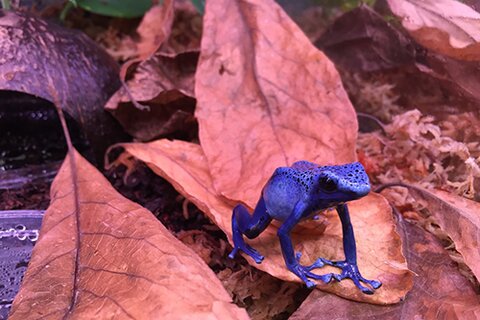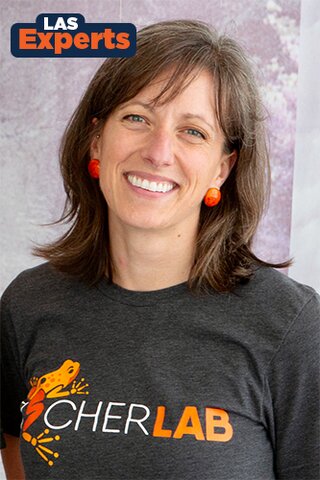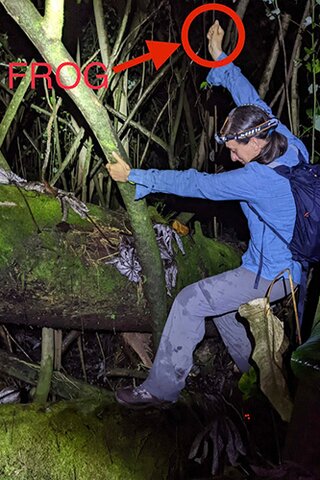As if frogs aren’t reason enough to leap into this profile, researchers are starting to see more clearly what the creatures can tell us about animal behavior and biological organization. Eva Fischer, professor of evolution, ecology, and behavior and Lincoln Excellence for Assistant Professors Scholar, is uncovering what “charismatic frogs”—her affectionate term for her often vividly colorful study subjects—reveal about brains and development even in species beyond their own.

What are you currently researching? Why are you passionate about this area of study?
Biologists and non-biologists alike are fascinated by both widespread similarities and prodigious diversity in animal behavior. Nature documentaries, conservation agencies, and educators capitalize on the intuitive appeal of the fact that human and non-human animals exhibit similar behaviors – including aggression, courtship, and parental care – as well as the amazing diversity of forms these behaviors take and adaptations animals have to perform them. A modern extension of this fascination asks whether similarities in behavior are governed by the same underlying mechanisms. Exploration of underlying mechanisms can improve our understanding of the phenomena that shape evolution and dictate organisms’ ability to adapt to novel and changing environments. Moreover, the accuracy of the assumption that shared phenotypes share underlying mechanisms is central to the success or failure of using non-human model organisms in biomedical research.
In my lab, we use integrative approaches to address these questions across hierarchical levels of biological organization (from gene networks, to neural circuits, to physiology, to behavior) and timescales (from immediate, to developmental, to evolutionary). I believe that fundamental principles governing brains and behavior are most apparent in evolutionary and developmental contexts. We therefore leverage natural behavioral diversity with technological advances that allow cutting-edge work outside of traditional model systems. Specifically, we use charismatic frogs as a model system as well as a tool for community engagement. Just as we need human diversity in our teaching and research spaces, we need diversity in our study systems to address fundamental open questions and to distinguish shared core principles from species-specific diversity in the biological bases of behavior and its evolution.

Please describe how you overcame a challenge to better understand your area of study.
Working on non-traditional model species can be challenging! We don’t have all the research tools and tricks of better-established systems (like mice, flies, or worm). That said, tools that have come online in the last 15-20 years have really changed the scope for what is possible in non-models – these include things like next-generation sequencing and single cell sequencing. Applying these tools and understanding the multivariate datasets they produce has been challenging but also exciting. For example, it helped us to find out that the same brain regions and molecules important for parental care in mammals are also those active in our frog parents!
Describe a moment when your professional career changed direction.
Before I started graduate school I worked as a laboratory technician in a lab studying stress and addiction using rats as a model system. I thought this was a good fit because I knew I was interested in studying the brain. However, this experience made me realize that – while I think that work is really important and valuable – it wasn’t for me. I really wanted to understand the neural mechanisms of natural behaviors, and neural mechanisms in the context of evolution and adaptation. So, I searched around for graduate programs in this area. In the process I learned that there is a name for what I wanted to do (neuroethology) and found the perfect lab, where I changed from working on rats to Trinidadian guppies (small fish). I still use many of the skills that I learned as a lab technician and realizing what I DID NOT want to do was a really valuable step in identifying what I DID want to do.

What kinds of lessons do you make it a point to impart on your students?
My teaching and mentorship philosophies rely fundamentally on the belief that the classifications of teacher (one who has knowledge) versus learner (one who seeks knowledge) are context dependent and non-mutually exclusive. That means that everyone has something to contribute and that our different backgrounds, experiences, and skills can be leveraged as a strength for all of us to learn. I hope this recognition instills my students and mentees with curiosity and critical thinking skills, and the recognition and independence to be architects of their own education and career trajectories. I also try to remind my students (and myself!) to embrace a growth mindset where knowing less than someone else or receiving constructive criticism is not a bad thing, it’s an opportunity to grow and learn.
What was one of your first jobs? How did it affect your decision to become a professor?
I worked in a café making coffee and sandwiches and selling pastries. As anyone who has worked in food service can tell you, you learn a lot about human nature! While that didn’t affect my decision to want to be a professor, experiences of dealing with other humans is certainly something that is also a central challenge of this job. Feeling the effects of people being rude and condescending versus kind and generous shaped the way I think about my interactions with others.
What is your proudest or most significant achievement?
I think I am most proud that I stuck it out and have made it this career stage. Getting a PhD is hard. Being a postdoc is hard. Getting a faculty job is hard. (I note these things are extra hard for certain groups of people, I’ve been fortunate to have many privileges along the way). I’m proud that I kept going and have now established my lab and independent research program. I hope that my most significant achievement will be to foster an environment that lets my trainees and students succeed – their success will be the best measure of my own.
Editor’s note: Visit Eva Fischer’s community engagement website or her research website for more about her study of frogs.